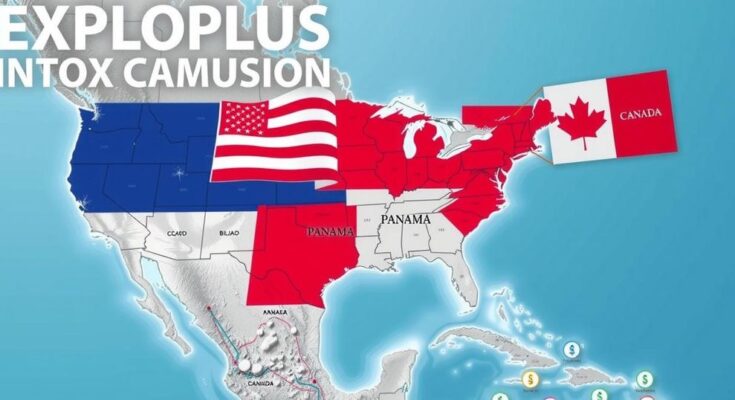President-elect Donald Trump is teasing U.S. territorial expansion into Canada, Greenland, and the Panama Canal, blending genuine policy interest with provocative rhetoric. His proposals, which echo 19th-century Manifest Destiny concepts, have been met with strong opposition from foreign leaders, highlighting the complexities of his administration’s foreign policy approach.
President-elect Donald Trump has raised eyebrows with suggestions regarding American territorial expansion, indicating a desire that could rival historical acquisitions such as the Louisiana Purchase and the purchasing of Alaska from Russia. He has recently proposed that the United States might absorb Canada as the 51st state, threatened to take control of the Panama Canal, and reiterated interest in acquiring Greenland, a territory of Denmark. While Trump’s comments often blend genuine policy considerations with provocations aimed at energizing his political base, the notion of such expansions resembles the 19th-century doctrine of Manifest Destiny, suggesting a belief in America’s divine right to expand its influence.
Specifically, Trump called the ownership of Greenland an “absolute necessity” for enhancing national security and freedom globally. His remarks regarding the Panama Canal, termed a “vital national asset,” were couched in a threat to impose lower tolls on American vessels using the route, thereby promoting a nationalist agenda often encapsulated by his mantra of “America First.” This approach is further evidenced by his stated intentions to classify drug cartels as foreign terrorist organizations, which could lead to military actions on Mexican soil, raising concerns about sovereignty and U.S.-Mexico relations.
Trump’s transition team has not clarified whether these territorial aspirations are genuine or strategic posturing. Many insiders believe that external factors and concerns affecting U.S. interests, such as trade with Panama, are influencing his rhetoric. For example, lowering shipping fees on the Panama Canal might mitigate the effect of anticipated tariff increases on imported goods. Critics, including Panama’s President José Raúl Mulino, have firmly rejected Trump’s claims, asserting that the control of the canal is “not negotiable” following its turnover in 1999 under a treaty. Despite Mulino’s rebuttals, Trump and his supporters have doubled down on their assertions by sharing memes that mockingly echo his message of reclaiming the canal.
Similarly, Trump’s previous endeavor to purchase Greenland was met with strong opposition from Danish leaders, emphasizing that Greenland is not for sale. After reiterating his interest while announcing Ken Howery as ambassador to Denmark, Trump trivialized the importance of the acquisition but noticeably maintained the narrative.
Finally, Trump’s comments suggesting an annexation of Canada seem to be more of a lighthearted tease directed at Prime Minister Justin Trudeau rather than a serious policy proposal. Nevertheless, they embody Trump’s characteristic negotiating style, where posturing serves to elicit reactions that align foreign leaders with his agenda.
Ultimately, while Trump’s musings about expanding U.S. territory provoke conversation and critique, they illustrate his administration’s approach to foreign relations marked by assertiveness and a blend of genuine and rhetorical strategies that often leaves observers questioning the seriousness of his proposals.
The article highlights President-elect Donald Trump’s provocative statements regarding potential U.S. territorial expansion involving Canada, Greenland, and the Panama Canal. Trump’s comments reflect a nationalist approach consistent with his “America First” policy, which aims to strengthen U.S. power and influence abroad while echoing sentiments from the 19th century regarding Manifest Destiny. The response from foreign leaders illustrates the contentious nature of his proposals and the complexities of international diplomacy.
In conclusion, President-elect Donald Trump’s recent proposals for territorial expansion suggest a blend of genuine ambition and rhetorical strategy designed to energize his support base. Despite strong rebukes from foreign leaders, these bold assertions demonstrate Trump’s characteristic approach to foreign policy—combining assertiveness with a willingness to provoke and challenge established norms in international relations. As his administration embarks on this new chapter, the global response to his proclamations will be crucial in shaping future U.S. foreign policy dynamics.
Original Source: www.cnn.com




